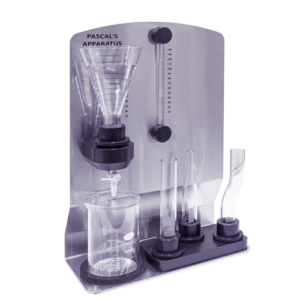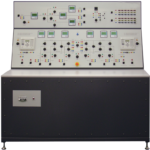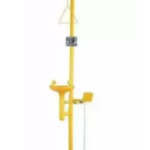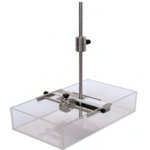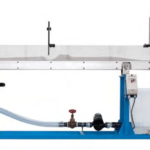Description:
This apparatus, designed to demonstrate Pascal’s principle, consists of a machined body incorporating a horizontal flexible diaphragm to which one of three alternative glass vessels can be fitted.
The diameter at the base of each vessel is common, but the shape of each vessel varies, one-parallel sided, one conical and one tapering inward.
The diaphragm, located at the base of the vessel, conveys the force from the water inside the vessel to a lever arm with a sliding counterweight.
A spirit level indicates when the lever arm is horizontal and therefore balancing the force/pressure at the base of the vessel. The force on the diaphragm depends on the depth of water above the diaphragm and the area of the diaphragm that is constant for all three vessels.
A height-adjustable pointer enables each of the vessels to be filled to the same depth so that the force/pressure can be shown to be common for all three vessels, independent of shape.
Experimental Content:
- Demonstrating that the pressure in a liquid contained in a vessel, varies with depth and is not affected by the shape of the vessel
Technical Specification:
- Parallel vessel: 26mm inside diameter
- Conical vessel: 26-101mm inside diameter at top
- Tapered vessel: 26mm to 9mm inside diameter at top
- Diameter at diaphragm: 56mm
- Maximum depth of water: 228mm (to top of vessels

